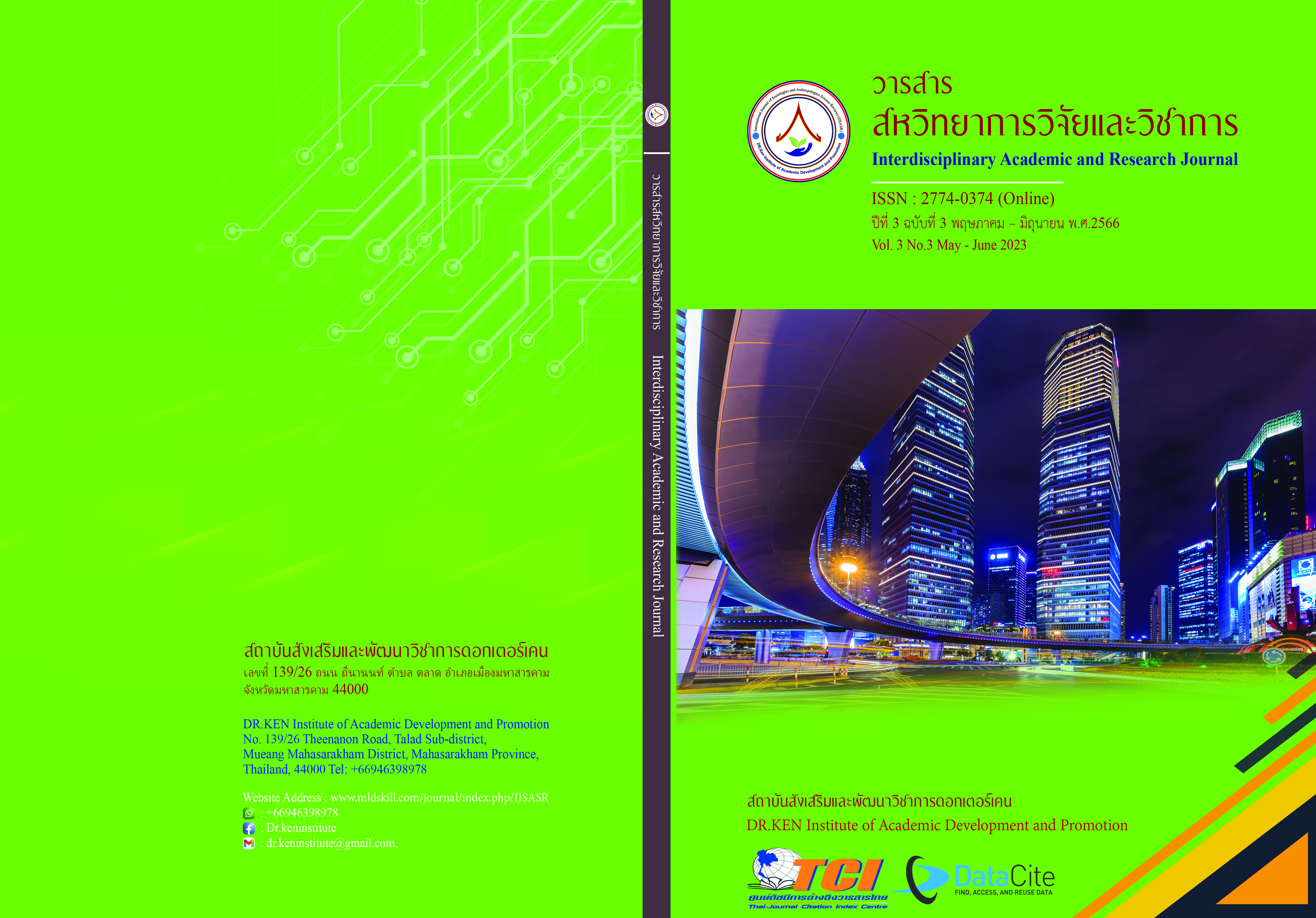Needs Assessment in Innovative Leadership Development of Elementary School Administrators of Educational Institutions under the Office of Chanthaburi Primary Educational Service Area Office 2
DOI:
https://doi.org/10.14456/iarj.2023.168Keywords:
Needs Assessment; , Innovative Leadership of School AdministratorsAbstract
Innovative leadership is important for the management of people in the organization, it stimulates people to be creative in their work, there is a common focus or goal in working, creating good relationships within the group, creating trust between each other in the work can inspire personnel to be able to work towards the vision of the organization. Thus, the purpose of this research was to study the problems and needs necessary for the development of innovative leadership among elementary school administrators. under the Office of Chanthaburi Primary Educational Service Area 2. The samples used in the research were school directors. supervisor teacher and the head teacher of the subject learning group elementary school Under the Office of Primary Educational Service Area, 300 people. Tools used in this research. as a questionnaire The statistics used in the research were mean and standard deviation. The needs were analyzed using a dual-response prioritization technique with Modified Priority Needs Index (PNImodified). The results showed that (1) The status quo in the development of innovative leadership models of primary school administrators. Under the Chanthaburi Primary Educational Service Area Office 2 in general, the practice was at a moderate level. (2) Presumptive conditions for the development of innovative leadership models of primary school administrators. Under the Office of Chanthaburi Primary Educational Service Area Office 2 in general, the conditions that should be in practice were at the highest level. (3) Necessary needs of the development of innovative leadership model of elementary school administrators Under the Office of Chanthaburi Primary Educational Service Area Office 2, overall, their needs were at a moderate level. When considering each aspect, it was found that the index of priorities of necessary needs was at a high level, consisting of being an innovative network builder. having an innovation strategy The priority index of necessary needs was at a medium level, consisting of having faith and prestige and Innovation Vision Creation and having the courage to take risks with innovation There is a low value of the priority index of needs.
References
กระทรวงศึกษาธิการ. (2553). แนวทางการดําเนินงานโรงเรียนมาตรฐานสากล. World-class standard school. กรุงเทพฯ: ชุมนุมสหกรณ์การเกษตรแห่งประเทศไทย.
กระทรวงศึกษาธิการ. (2560). แผนการศึกษาแห่งชาติ พ.ศ. 2560-2579. กรุงเทพฯ: กระทรวงศึกษาธิการ.
กุลชลี จงเจริญ. (2562). หน่วยที่ 12 ภาวะผู้นำเชิงนวัตกรรม. นนทบุรี: หาวิทยาลัยสุโขทัยธรรมาธิราช.
เกรียงศักดิ์ เจริญวงศ์ศักดิ์. (2557ก). ทำงานอย่างไรให้ก้าวหน้า. พิมพ์ครั้งที่ 4.กรุงเทพฯ: ซัคเซส มีเดีย.
เกรียงศักดิ์ เจริญวงศ์ศักดิ์. (2557ข). เรียนรู้ใช้ข้อมูลอย่างผู้ชนะ.พิมพ์ครั้งที่ 4.กรุงเทพฯ: ซัคเซส มีเดีย.
ฐิตินันท์ นันทะศรี. (2563). การพัฒนาตัวบ่งชี้ภาวะผู้นำเชิงนวัตกรรมของผู้บริหารสถานศึกษา สังกัดสำนักงานเขตพื้นที่การศึกษาประถมศึกษาในภาคตะวันออกเฉียงเหนือ.วิทยานิพนธ์ปรัชญาดุษฎีบัณฑิต. มหาวิทยาลัยราชภัฏสกลนคร. สกลนคร.
เดชา ลุนาวงค์, วาโร เพ็งสวัสดิ์ และวันเพ็ญ นันทะศรี. (2564). โมเดลความสัมพันธ์เชิงสาเหตุของปัจจัยที่ส่งผลต่อภาวะผู้นำเชิงนวัตกรรมของผู้บริหารสถานศึกษา สังกัดสำนักงานเขตพื้นที่การศึกษาประถมศึกษา ในภาคตะวันออกเฉียงเหนือ.หลักสูตรปริญญาปรัชญาดุษฎีบัณฑิต สาขาวิชาการบริหารและพัฒนาการศึกษา.มหาวิทยาลัยราชภัฏสกลนคร
ตฤณเศรษฐ์ รัตนรังสฤษฏ์. (2562). ความต้องการจำเป็นของการพัฒนาภาวะผู้นำเชิงนวัตกรรม ของผู้บริหารโรงเรียนในเครือเตรียมอุดมศึกษาพัฒนาการ. วารสารวิชาการ มหาวิทยาลัยราชภัฏพระนคร, 10 (2), 224-237.
นพรัตน์ มูลศรีแก้ว พชรวิทย์ จันทร์ศิริสิร และอำนาจ ชนะวงศ์. (2564).การประเมินความต้องการจำเป็นในการเสริมสร้างภาวะผู้นำเชิงนวัตกรรมของผู้บริหารโรงเรียนมัธยมศึกษา สังกัดสำนักงานคณะกรรมการการศึกษาขั้นพื้นฐาน.วารสารมหาวิทยาลัยราชภัฏยะลา :16 (3), 308-317.
บุศรา ทับทิมศรี วัชรีชูชาติ และ พงษ์ศักดิ์ รวมชมรัตน์ (2564) รูปแบบภาวะผู้นําเชิงนวตกรรมของผู้บริหารสถานศึกษาขั้นพื้นฐานโรงเรียนมาตรฐานสากล. วารสารวิชาการ สถาบันเทคโนโลยีแห่งสุวรรณภูมิ. 7 (1),545-558.
พิสิฐธวัฒน์ กลิ่นไธสงค์. (2559).การพัฒนาตัวบ่งชี้ภาวะผู้นำเชิงนวัตกรรมของผู้บริหารโรงเรียนมัธยมศึกษา สังกัดสำนักงานเขตพื้นที่การศึกษามัธยมศึกษา.วารสารบริหารการศึกษา มหาวิทยาลัยขอนแก่น คณะศึกษาศาสตร์ มหาวิทยาลัยขอนแก่น.12 (1),177-186.
ภิรญา สายศิริสุข. (2561). ภาวะผู้นำเชิงนวัตกรรมของผู้บริหารในโรงเรียนมัธยมศึกษากลุ่มสหวิทยาเขตปัญจภาคี สังกัดสำนักงานเขตพื้นที่การศึกษามัธยมศึกษาเขต 4. บัณฑิตวิทยาลัย : มหาวิทยาลัยเกษตรศาสตร์.
ศศิประภา ชัยประสิทธิ์. (2553). องค์กรแห่งนวัตกรรม: ทางเลือกของผู้ประกอบการยุคใหม่. วารสารนักบริหาร, 30 (2), 60-63.
สมศักดิ์ คงเที่ยง. (2555). หลักบริหารการศึกษา. กรุงเทพฯ: พี.เอ.ลีฟวิ่ง.
สำนักงานเขตพื้นที่การศึกษาประถมศึกษาจันทบุรีเขต 2. (2564). ข้อมูลทั่วไปของสำนักงานเขตพื้นที่การศึกษาประถมศึกษาจันทบุรีเขต 2. Retrieved on August 21, 2021, from: https://www.chan2.go.th/.
สำนักงานเลขาธิการสภาการศึกษา. (2560). แผนการศึกษาแห่งชาติ พ.ศ. 2560-2579. พิมพ์ครั้งที่ 2. กรุงเทพฯ: สำนักงานเลขาธิการสภาการศึกษา.
เสน่ห์ จุ้ยโต. (2554). การบริหารนวัตกรรมแนวใหม่. นนทบุรี: โรงพิมพ์มหาวิทยาลัย สุโขทัยธรรมาธิราช.
อภิรักษ์ บุปผาชื่น. (2563). ภาวะผู้นำเชิงนวัตกรรม: การขับเคลื่อนองค์การสู่ความเป็นเลิศ. Journal of Educational Innovation and Research.4 (3), 205-216.
Krejcie, R.V., & Morgan, D.W. (1970) Determining Sample Size for Research Activities. Educational and Psychological Measurement. 30, 607 – 610
Alharbi, I. (2021) Innovative Leadership: A Literature Review Paper. Open Journal of Leadership, 10, 214-229. doi: 10.4236/ojl.2021.103014.
Robert, F.B., & Jeff, Z. (2010). Leadership vacuums and overcoming barriers to innovation. Retrieved August21, 2018, from http://www.business-strategy-innovation.com/2010/04/leadershipvacuums-and-overcoming.html
Downloads
Published
How to Cite
Issue
Section
License
Copyright (c) 2023 ไปรยา แลกะสินธุ์, ทรงยศ แก้วมงคล, ดวงกมล แก้วแดง

This work is licensed under a Creative Commons Attribution-NonCommercial-NoDerivatives 4.0 International License.
Copyright on any article in the Interdisciplinary Academic and Research Journal is retained by the author(s) under the under the Creative Commons Attribution-NonCommercial-NoDerivatives 4.0 International License. Permission to use text, content, images, etc. of publication. Any user to read, download, copy, distribute, print, search, or link to the full texts of articles, crawl them for indexing, pass them as data to software, or use them for any other lawful purpose. But do not use it for commercial use or with the intent to benefit any business.
















.png)


